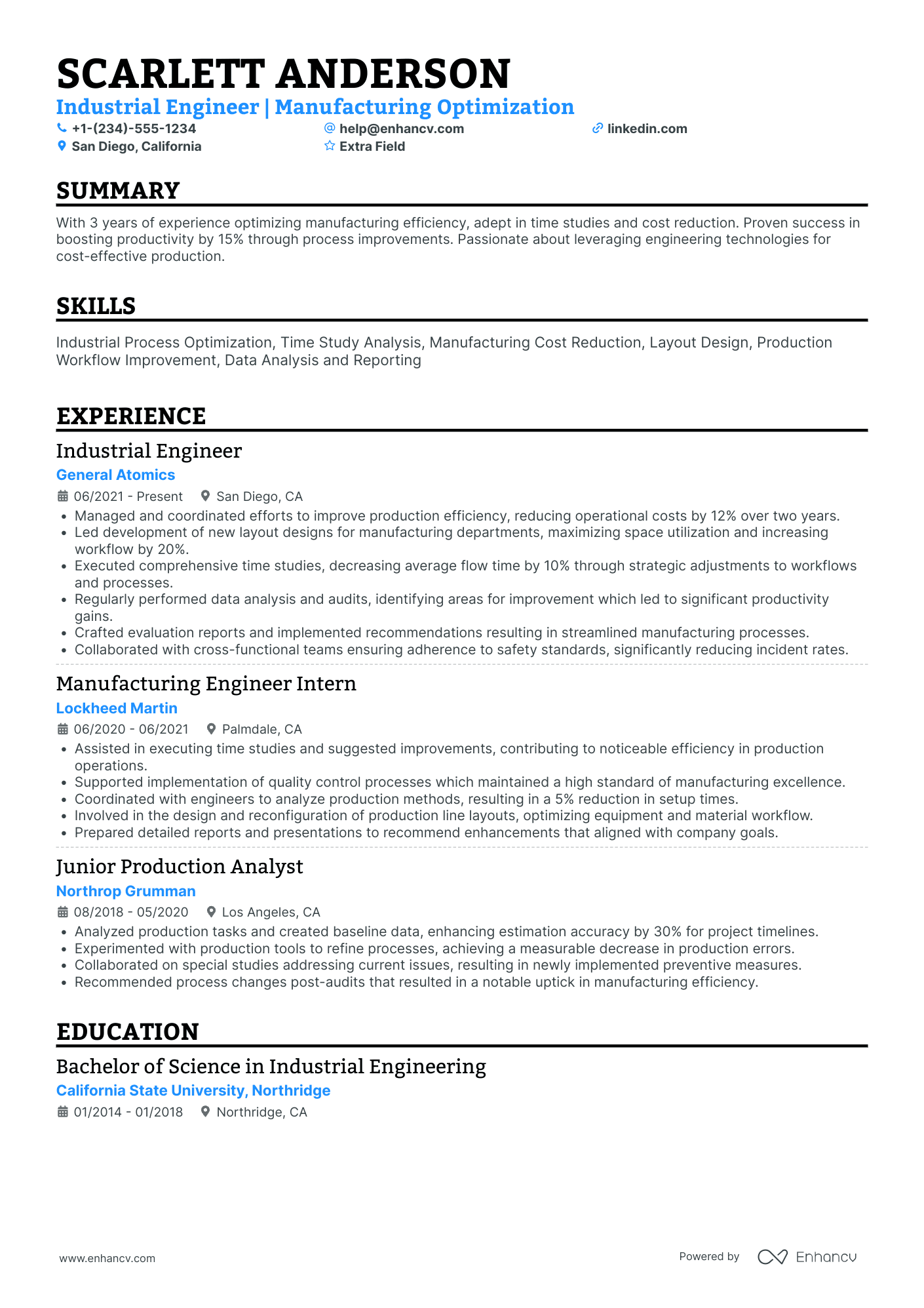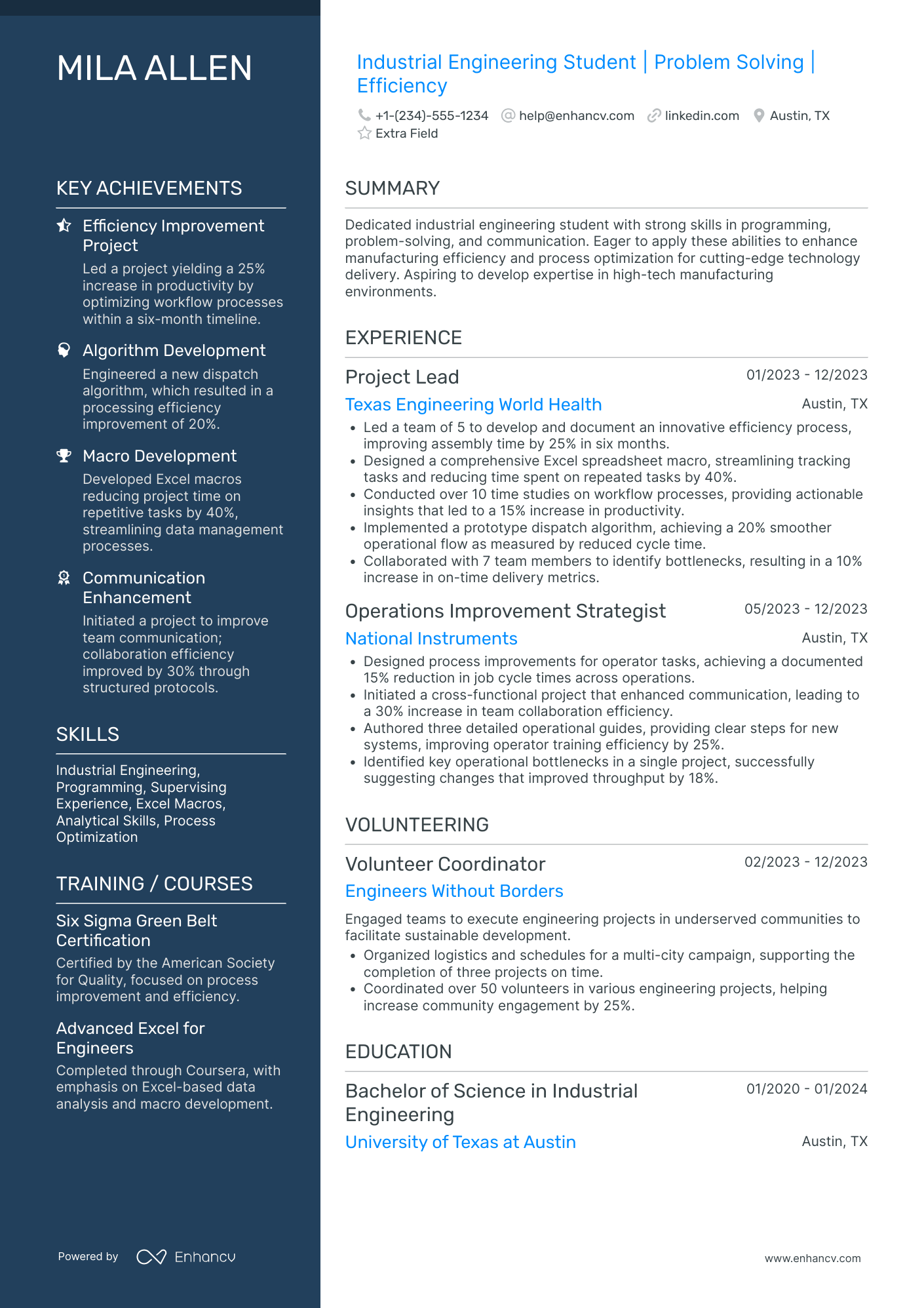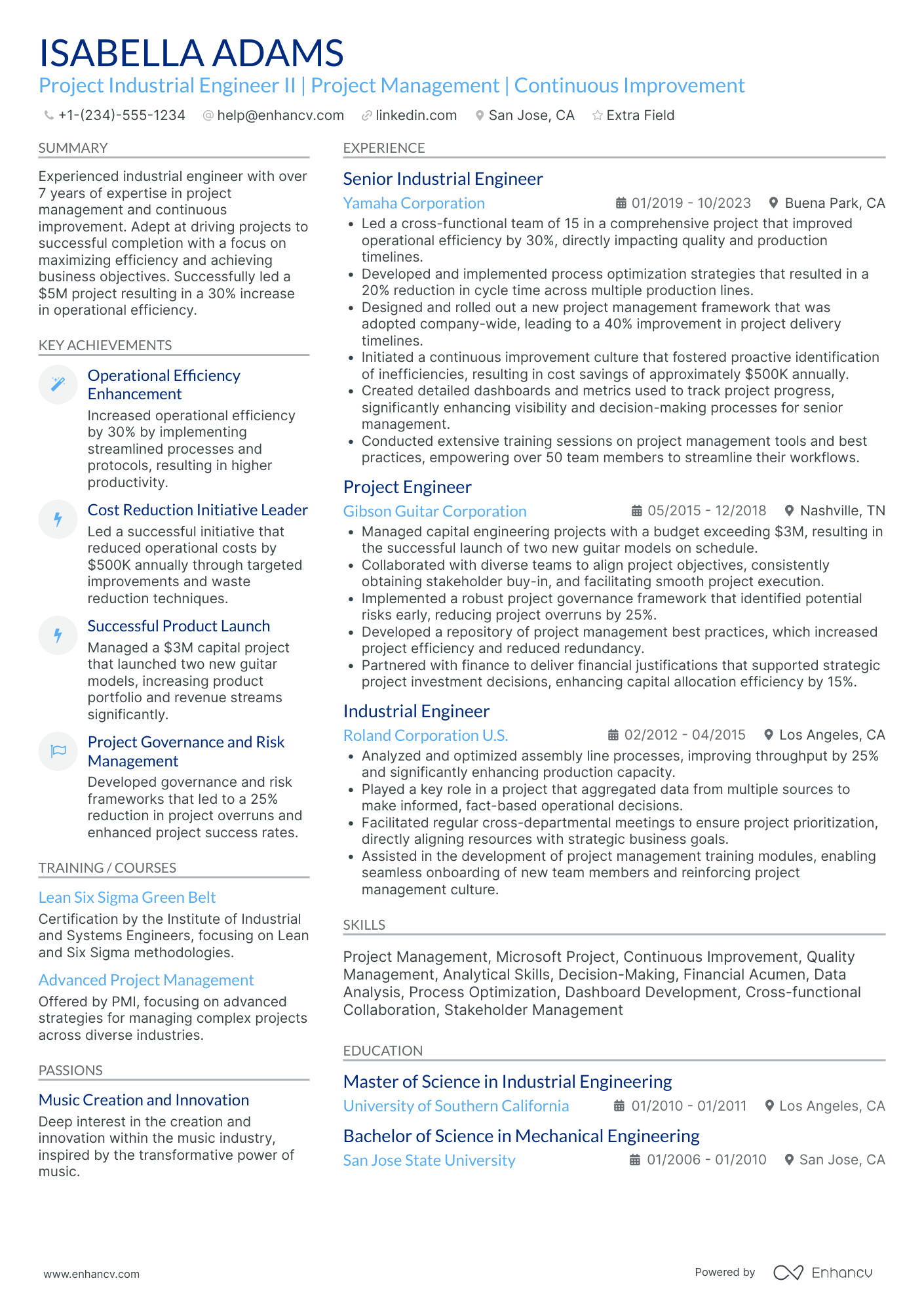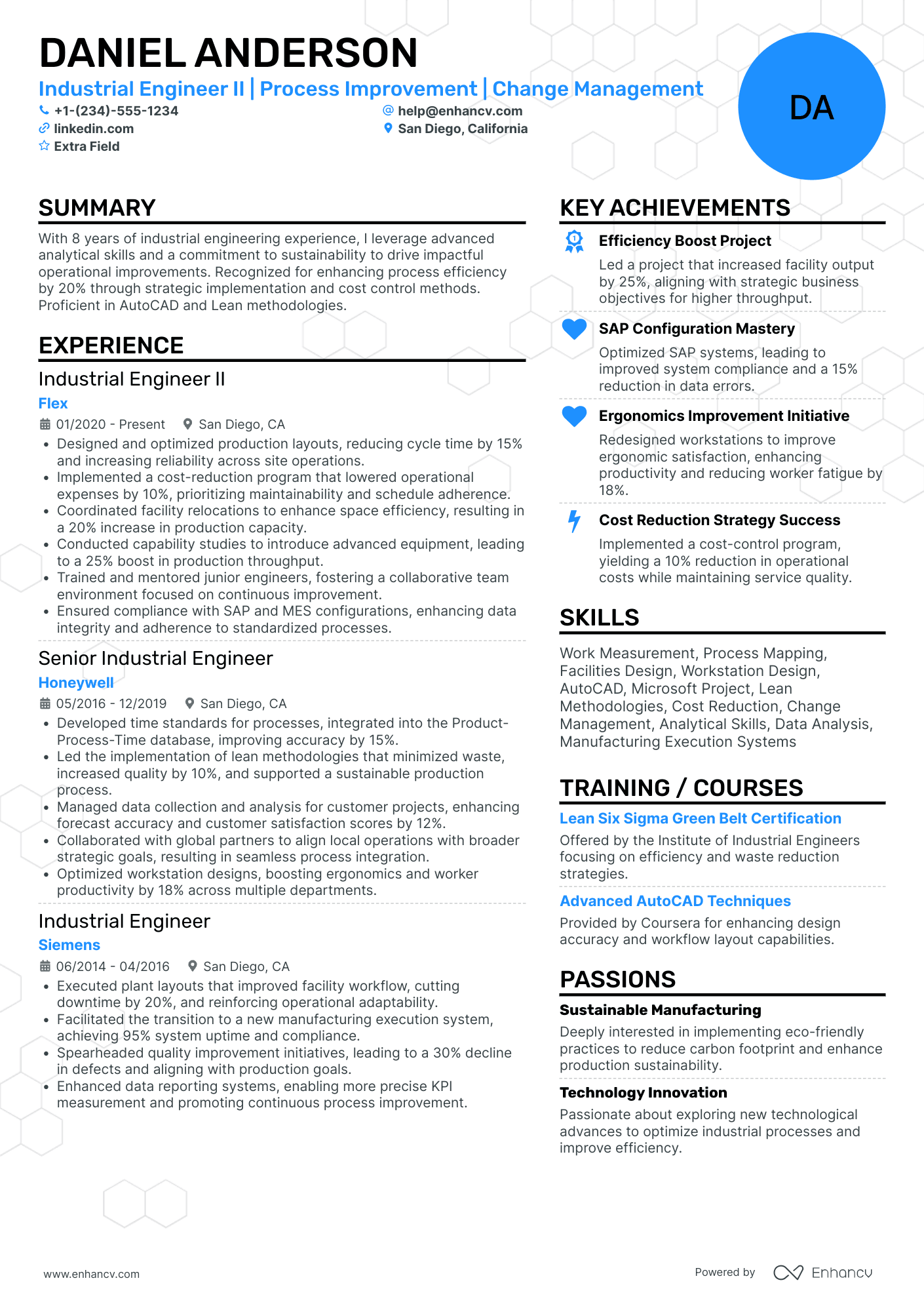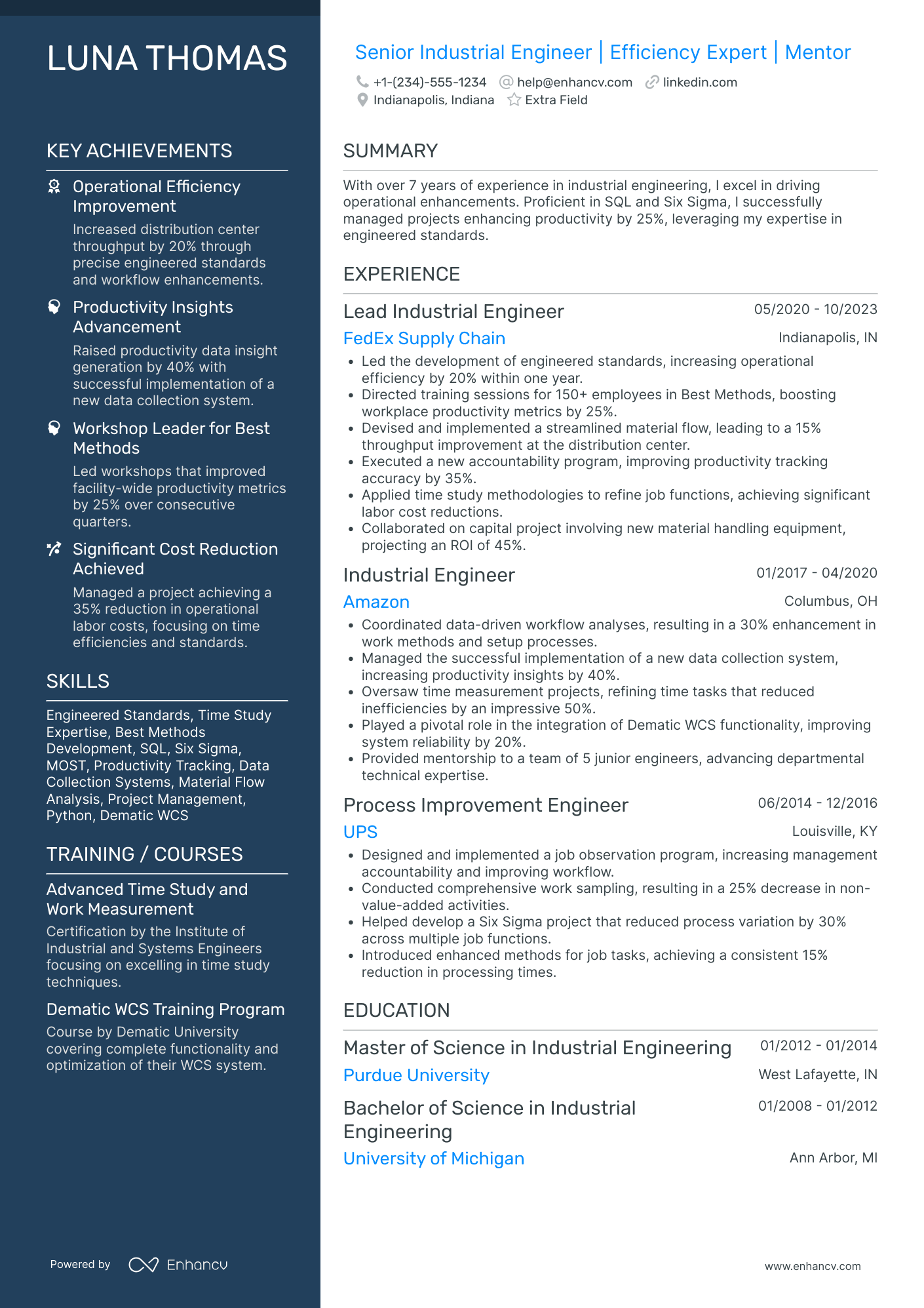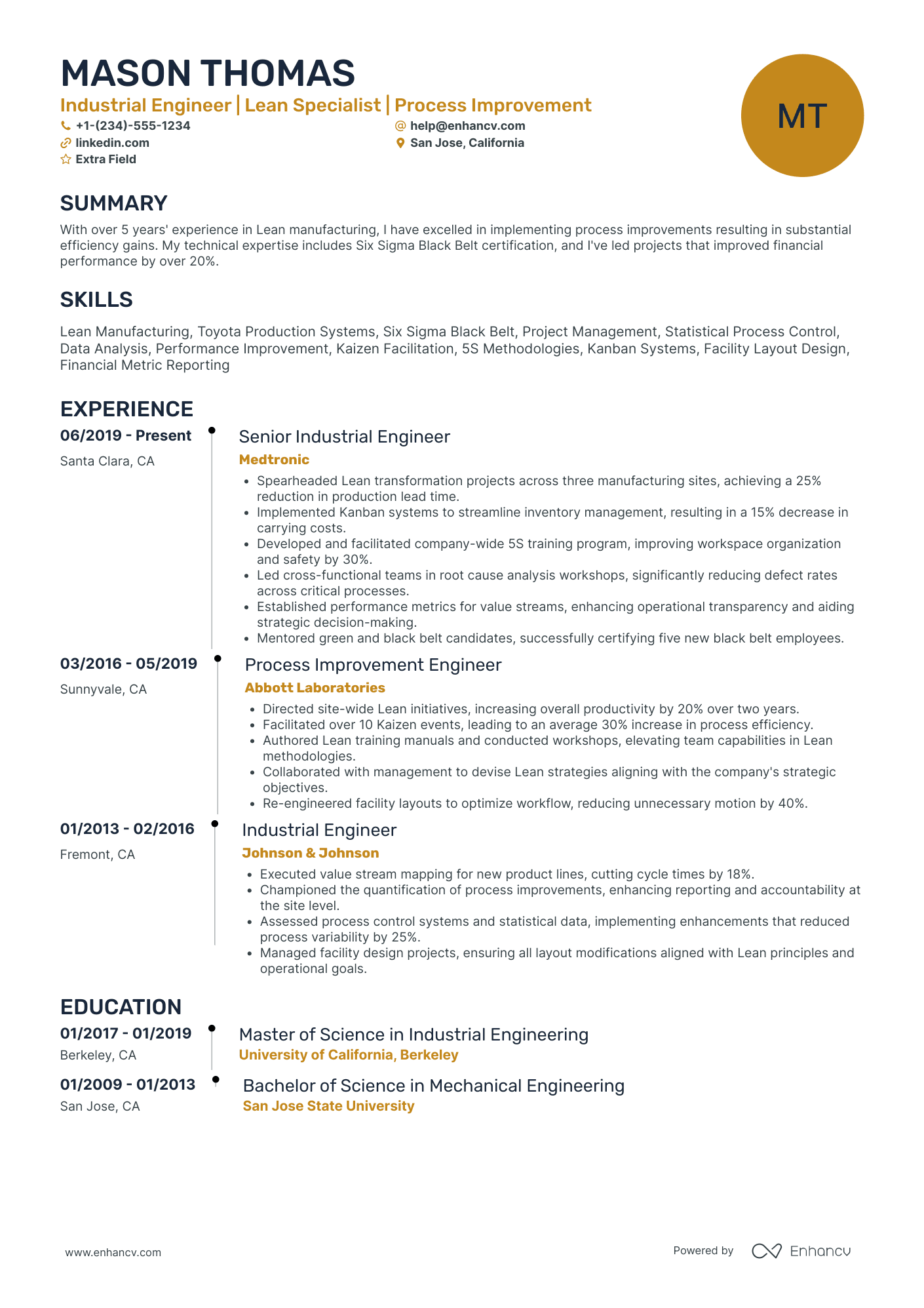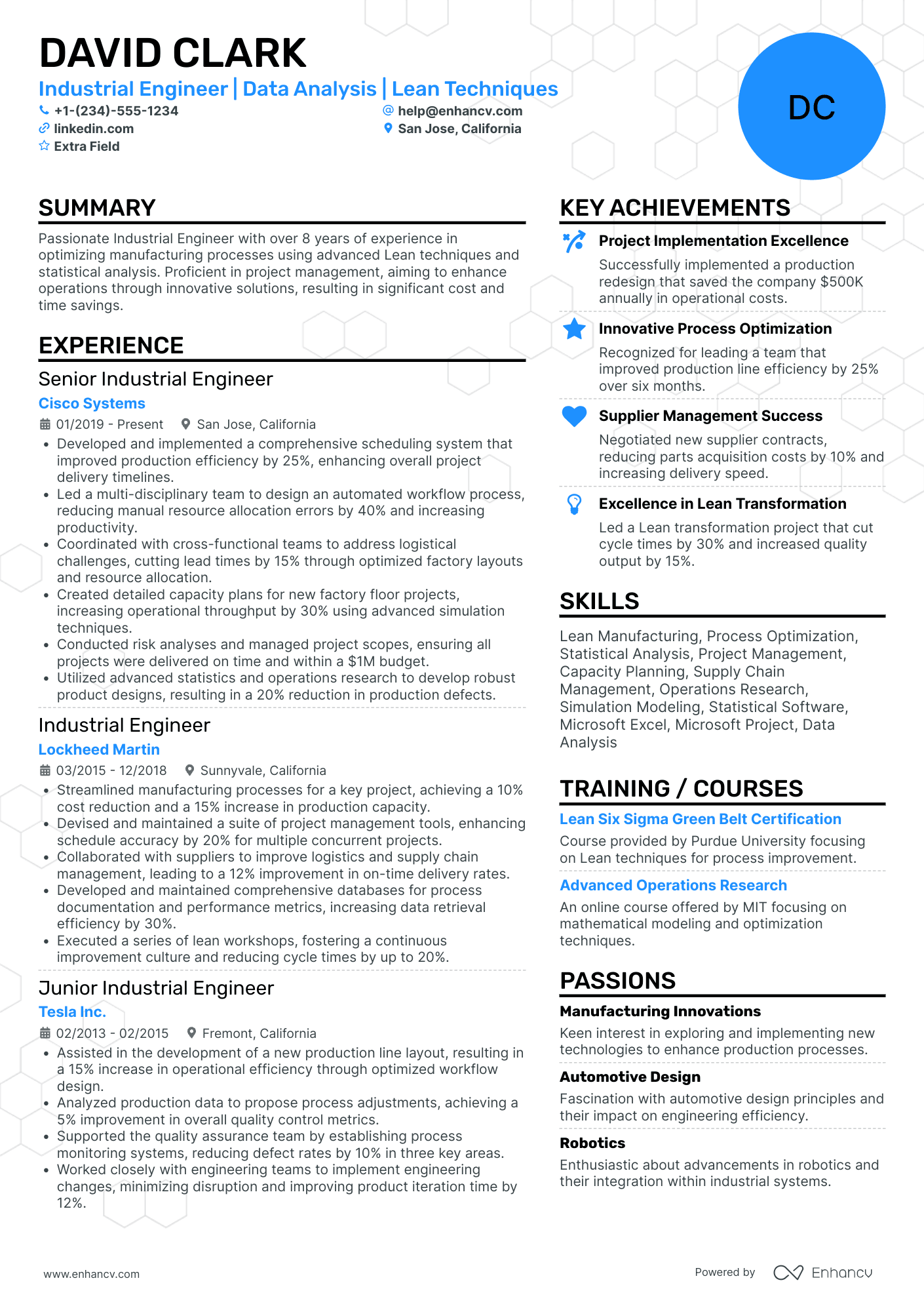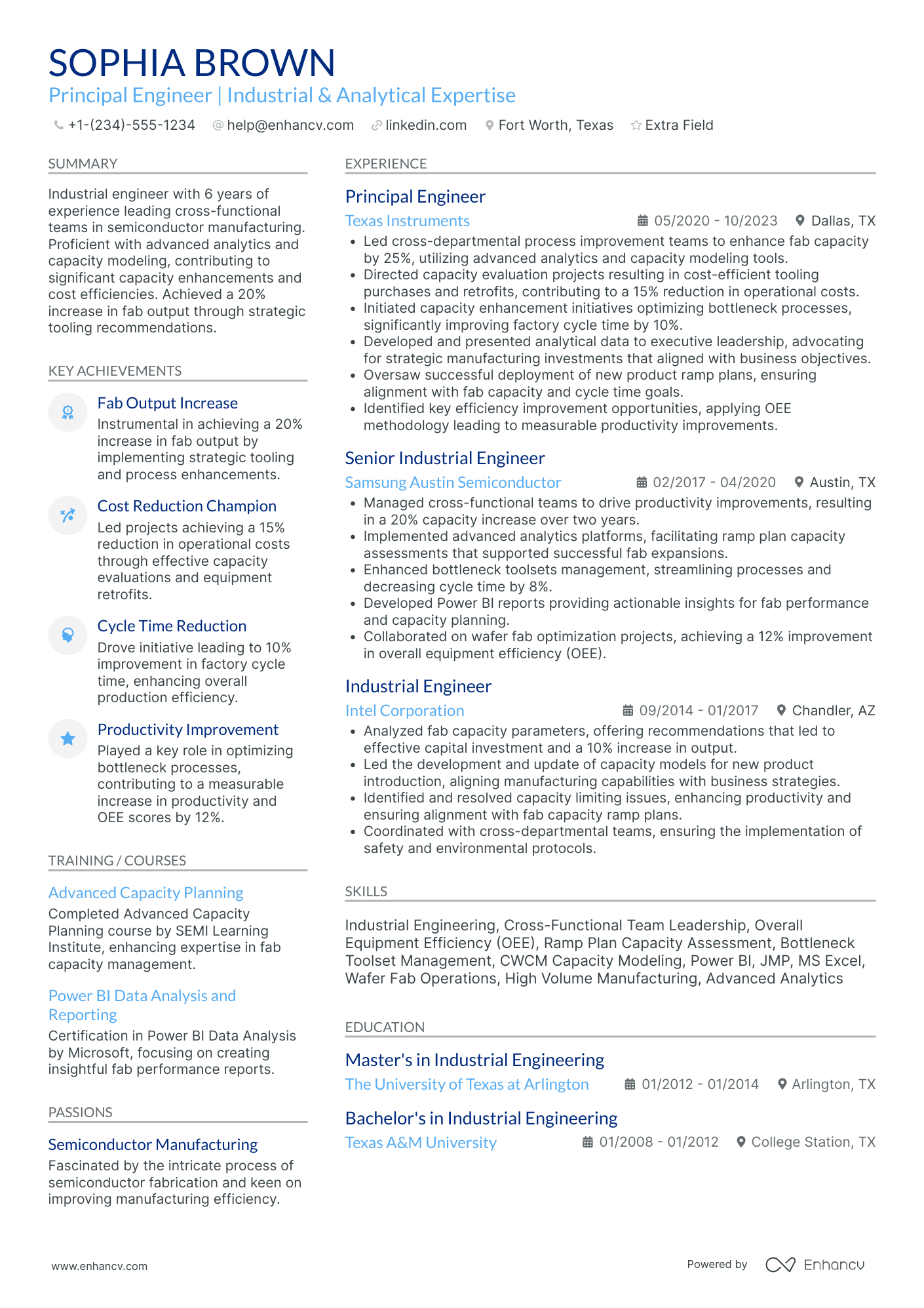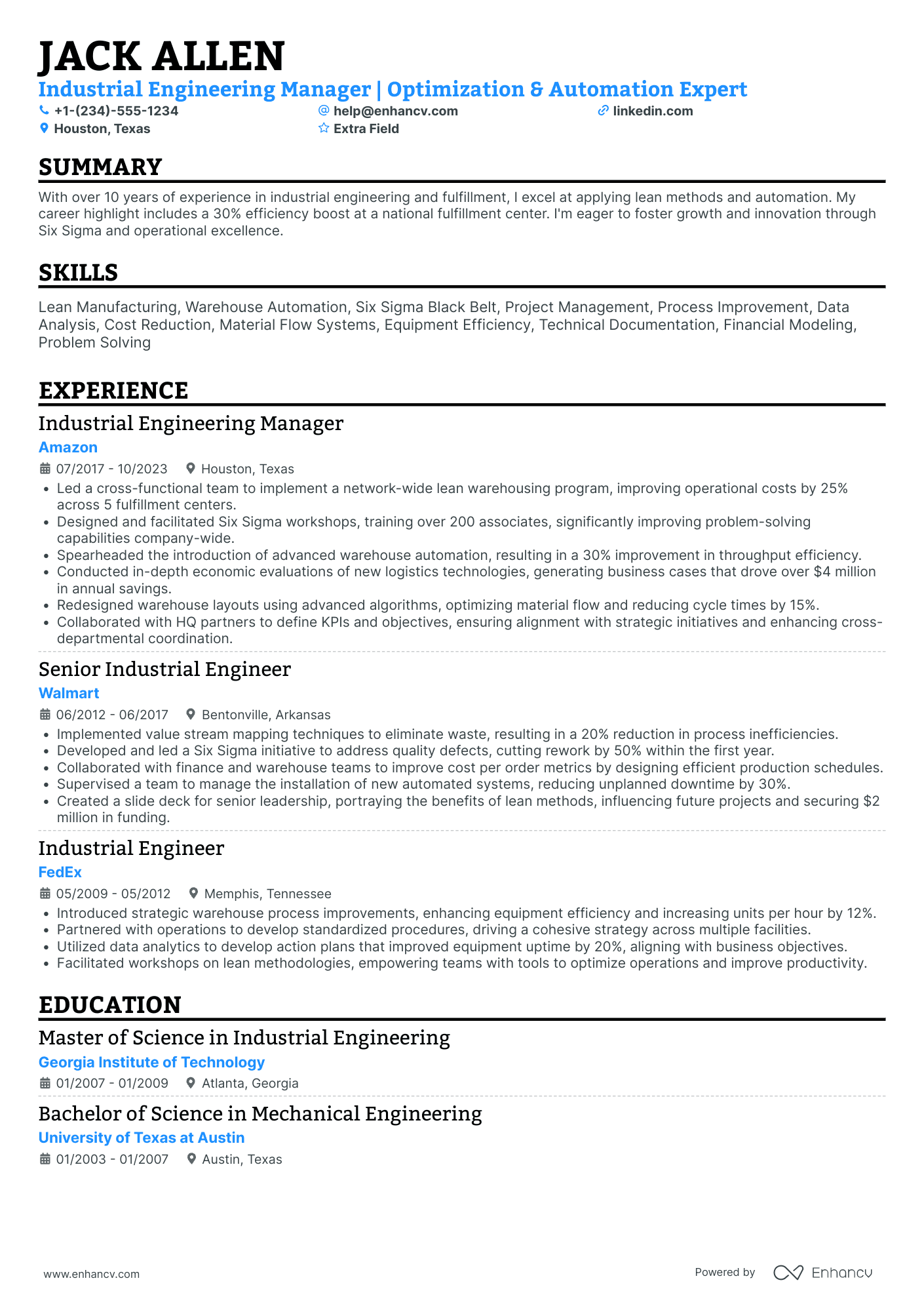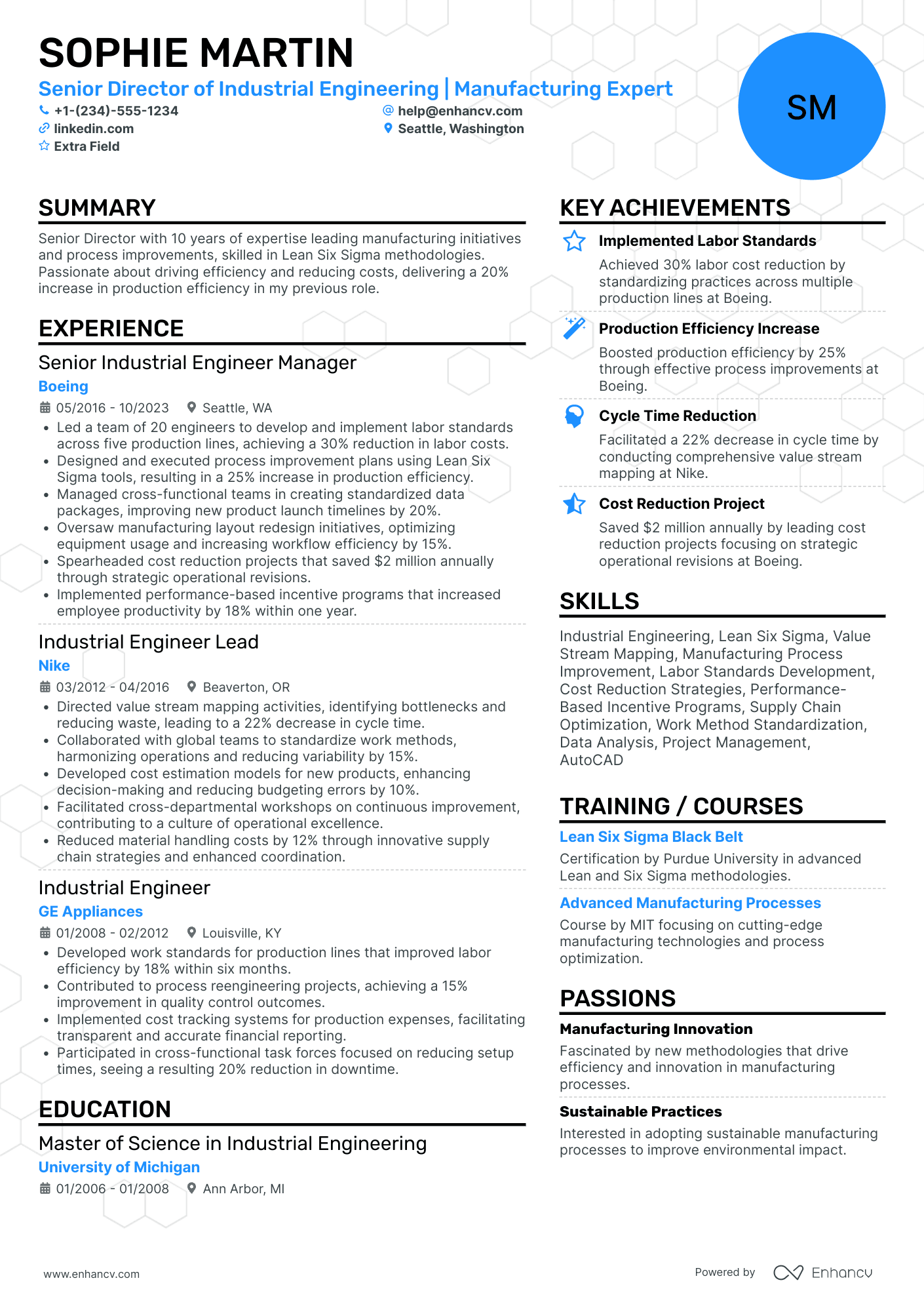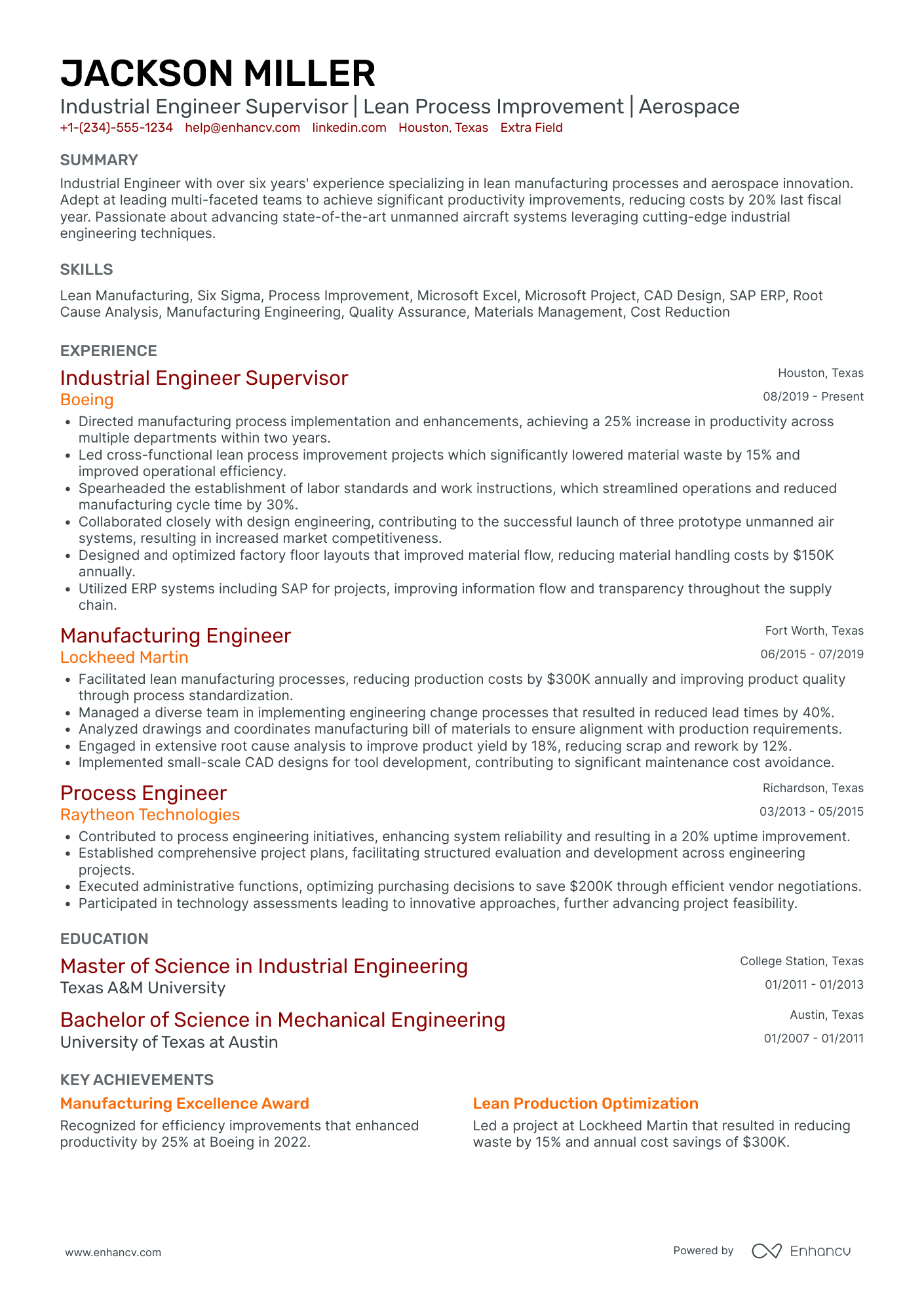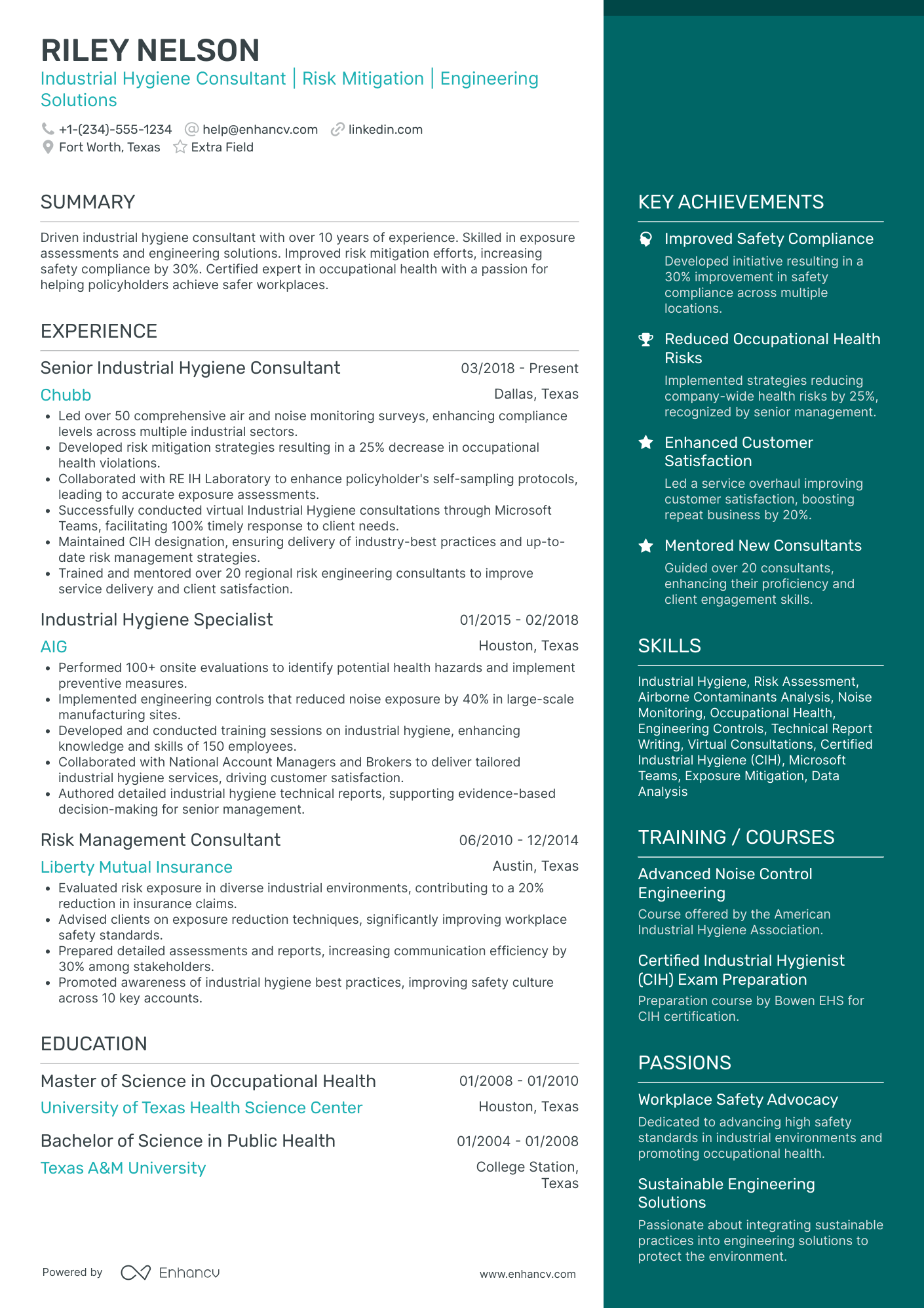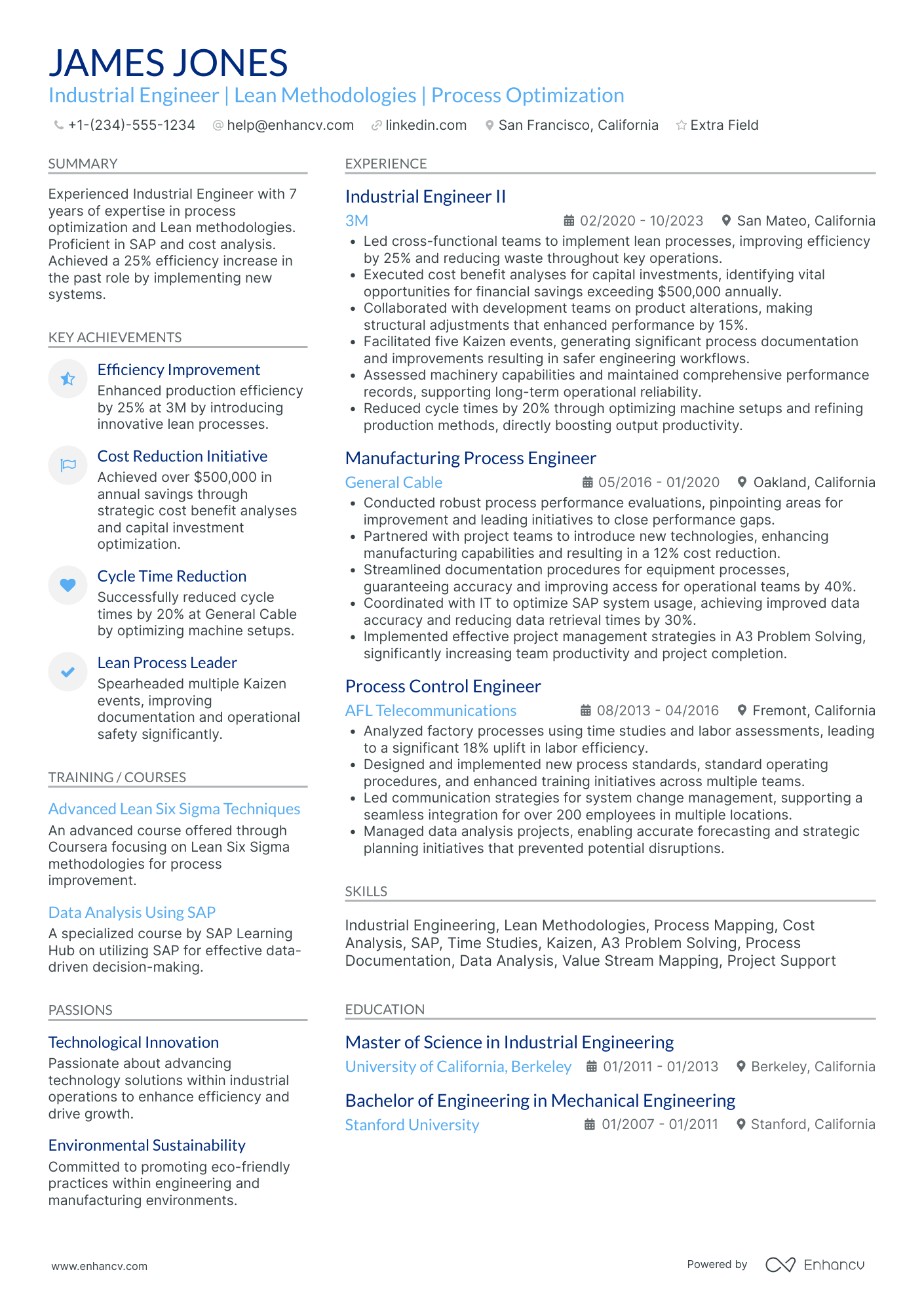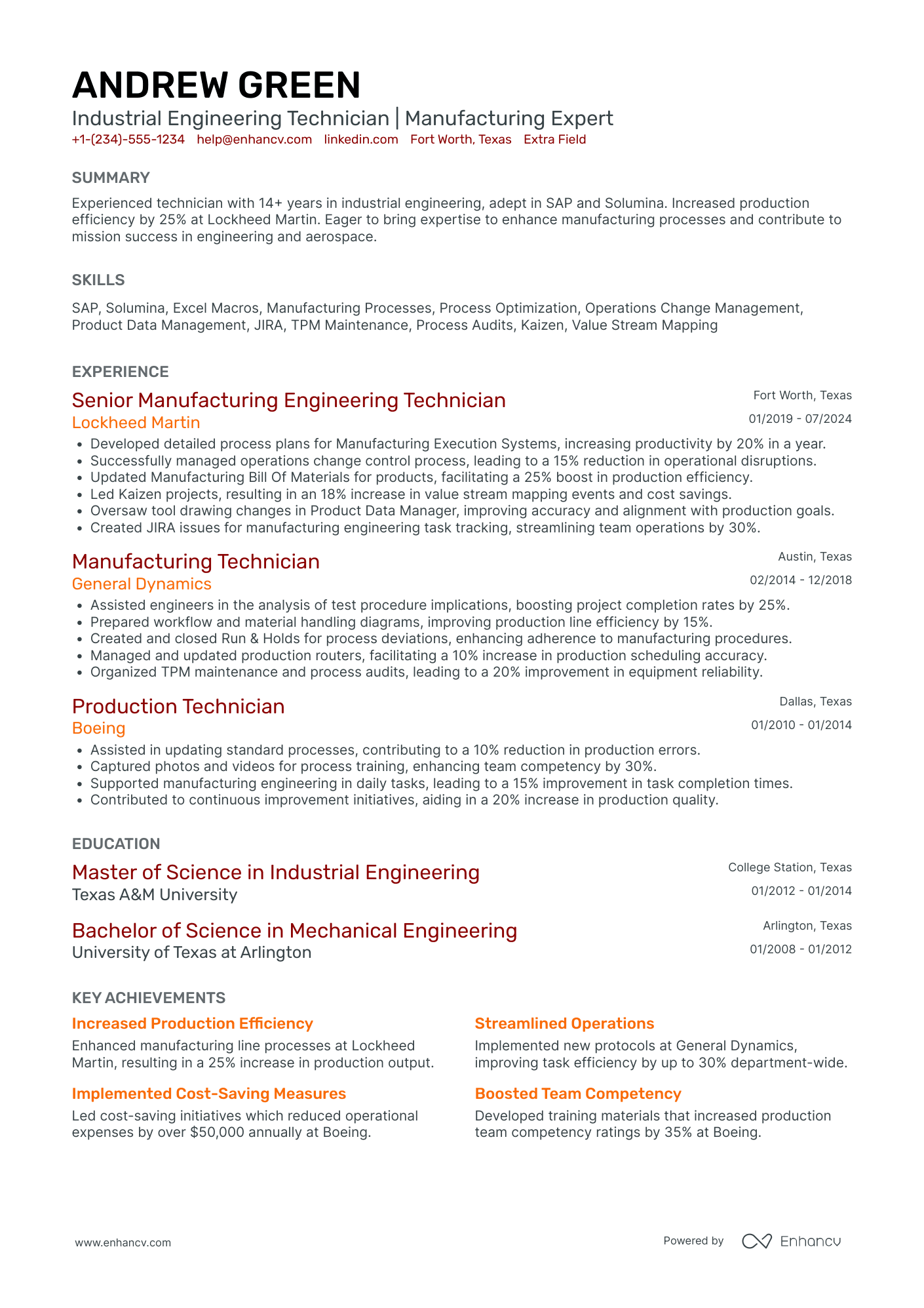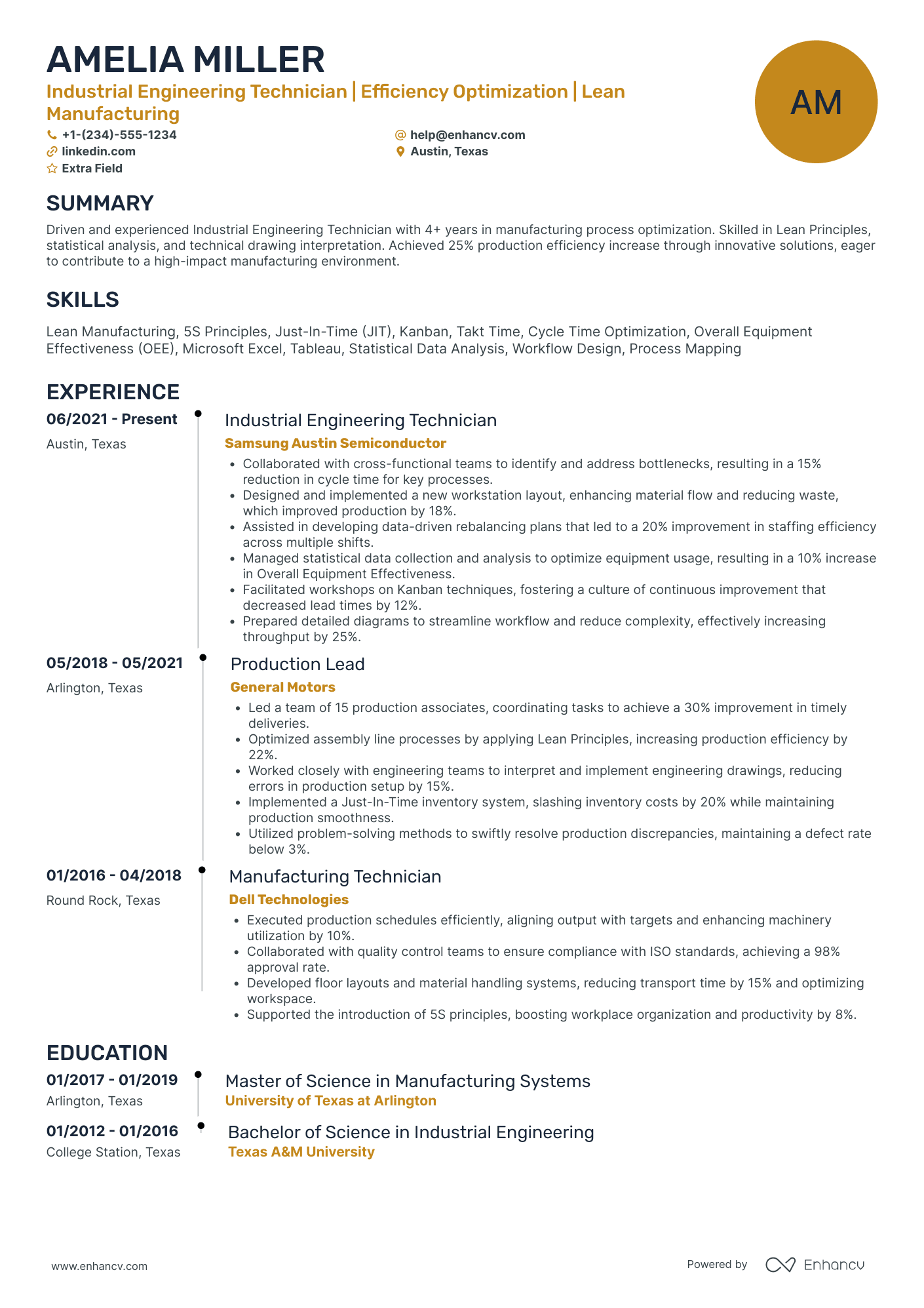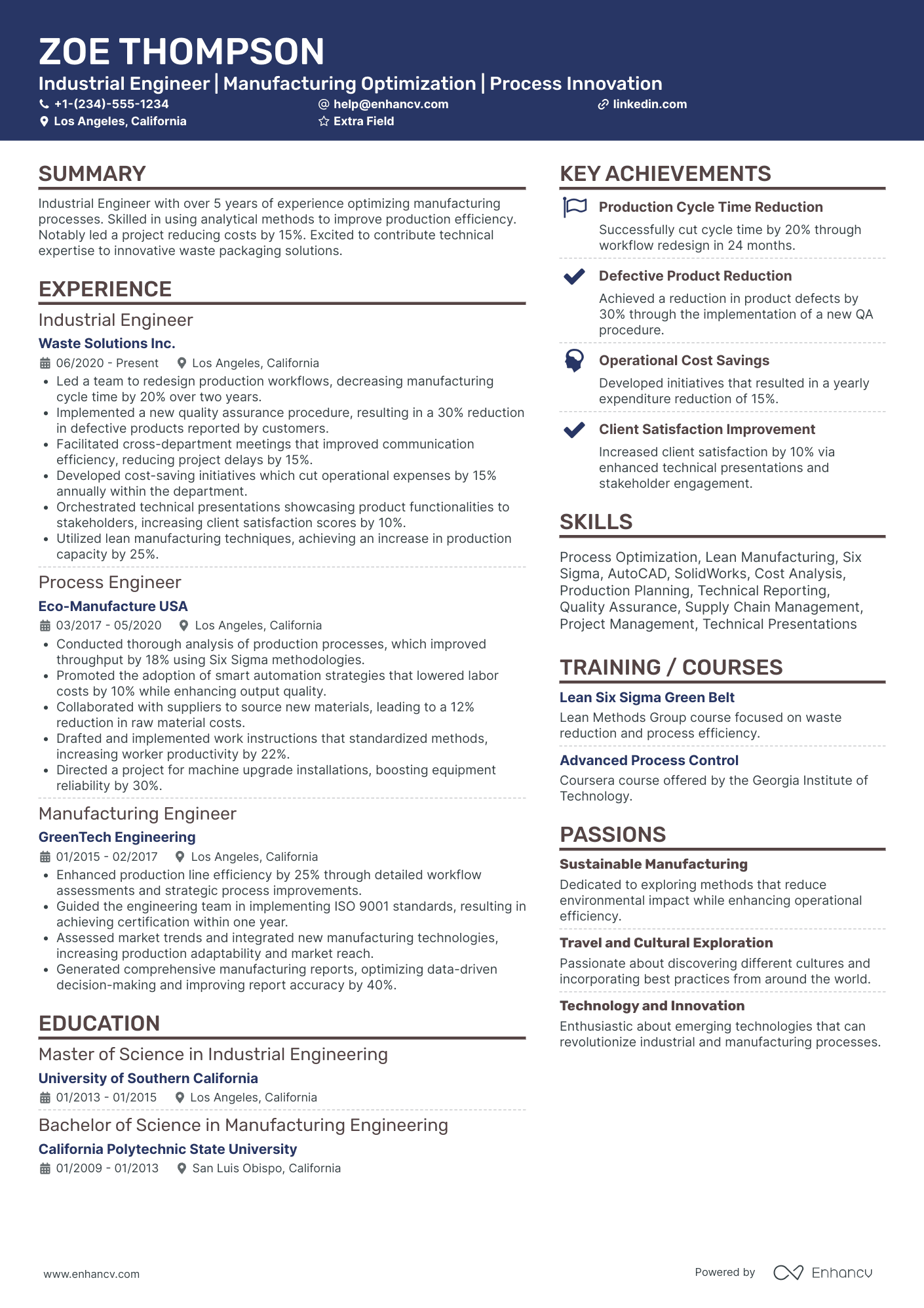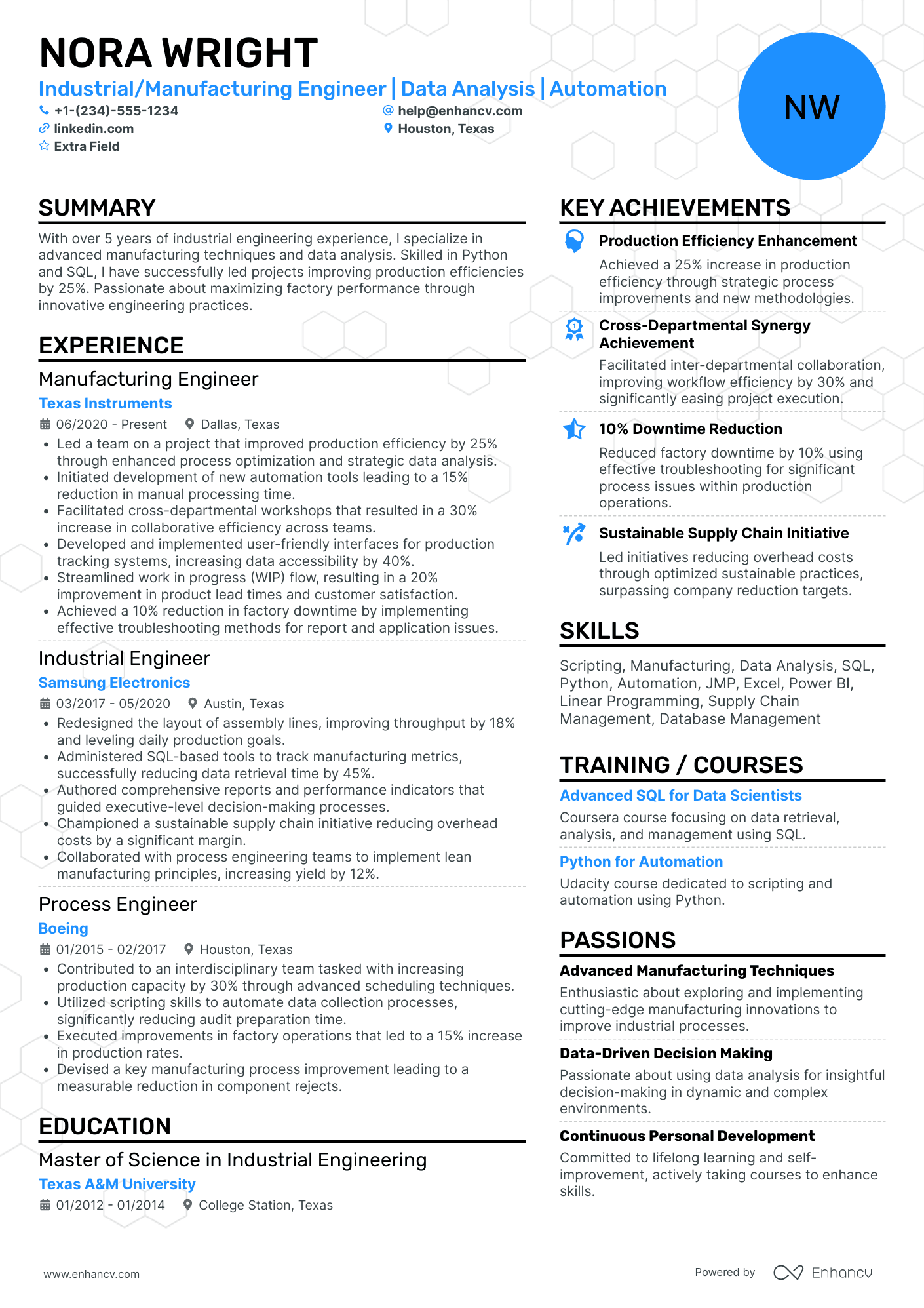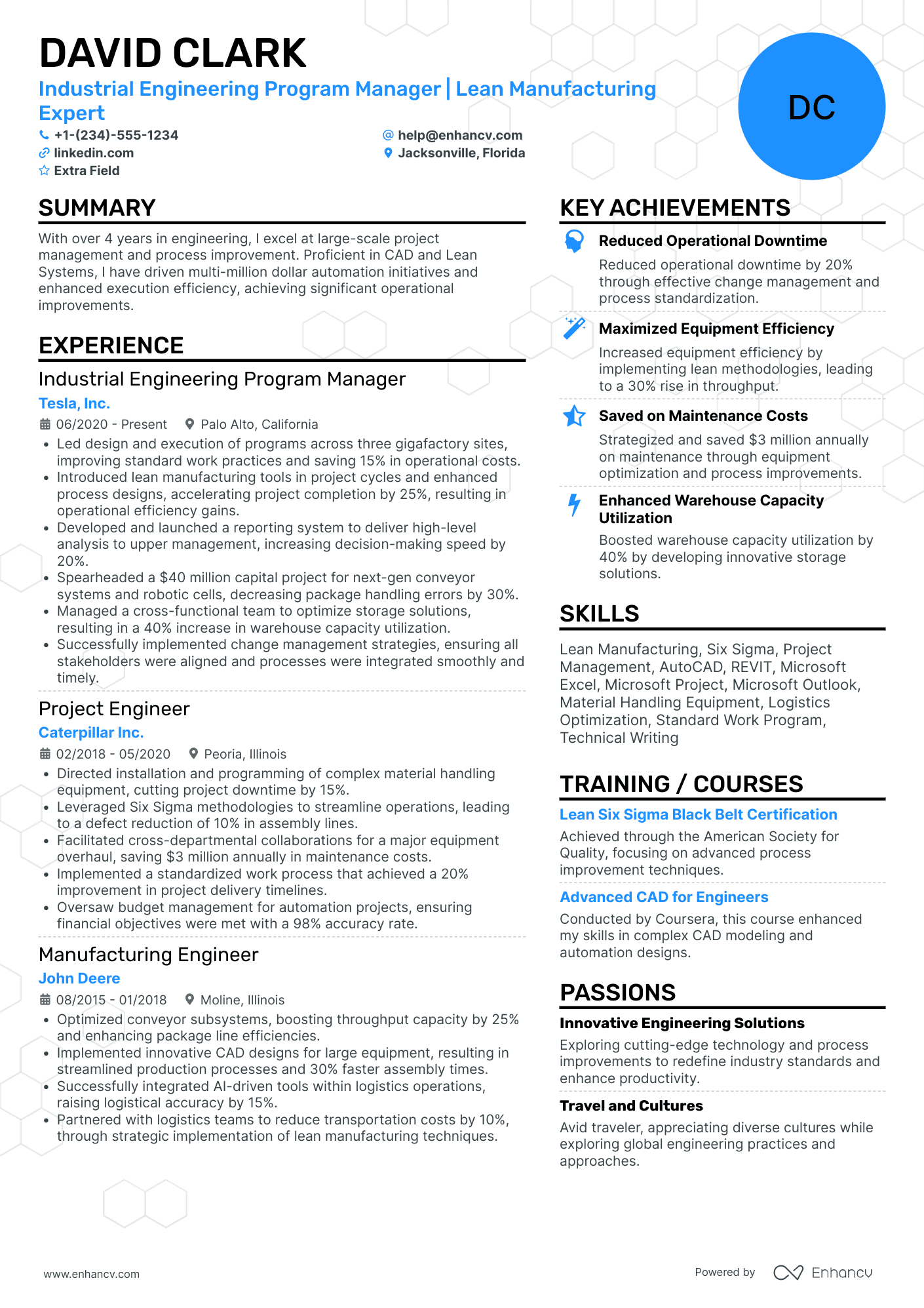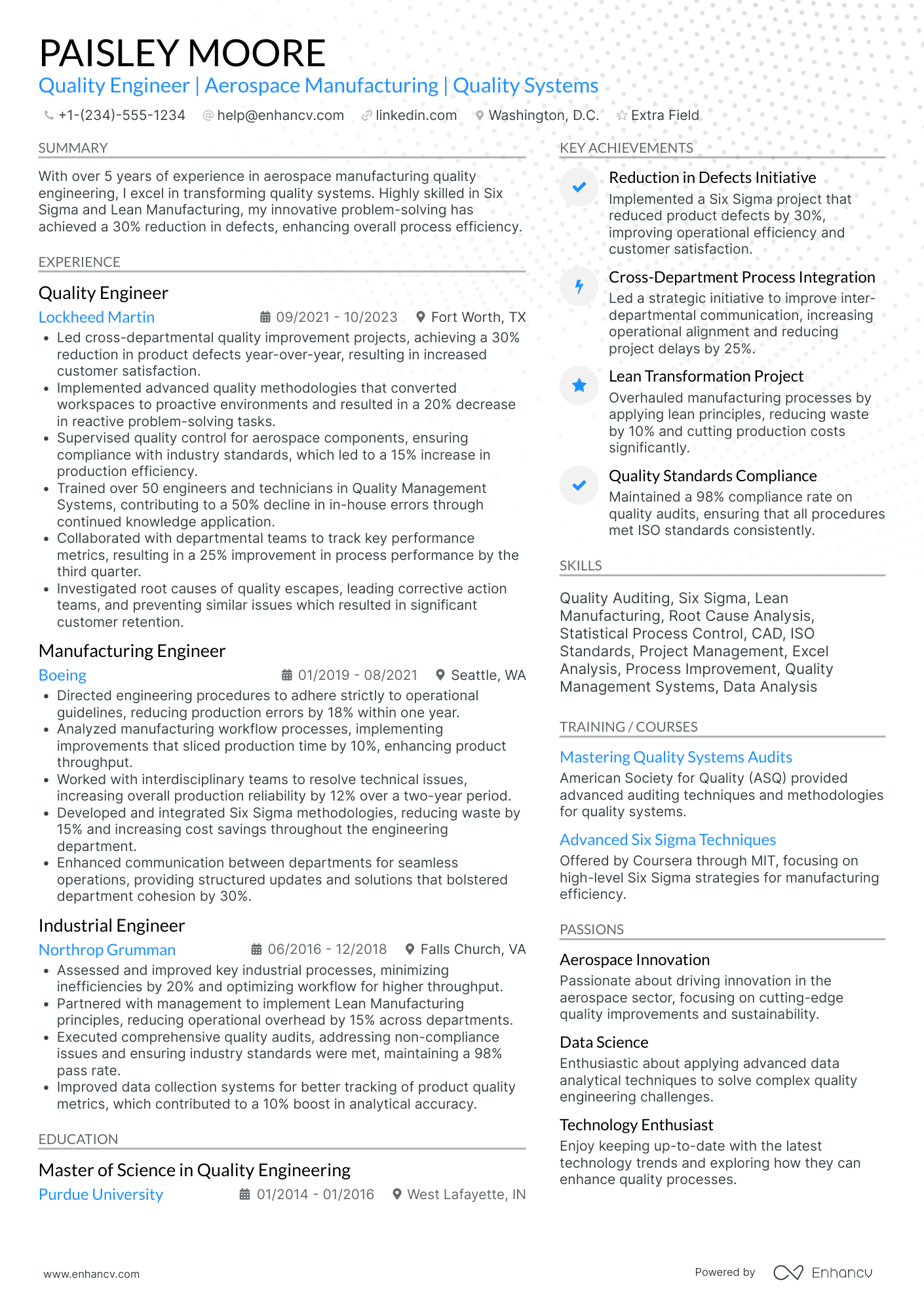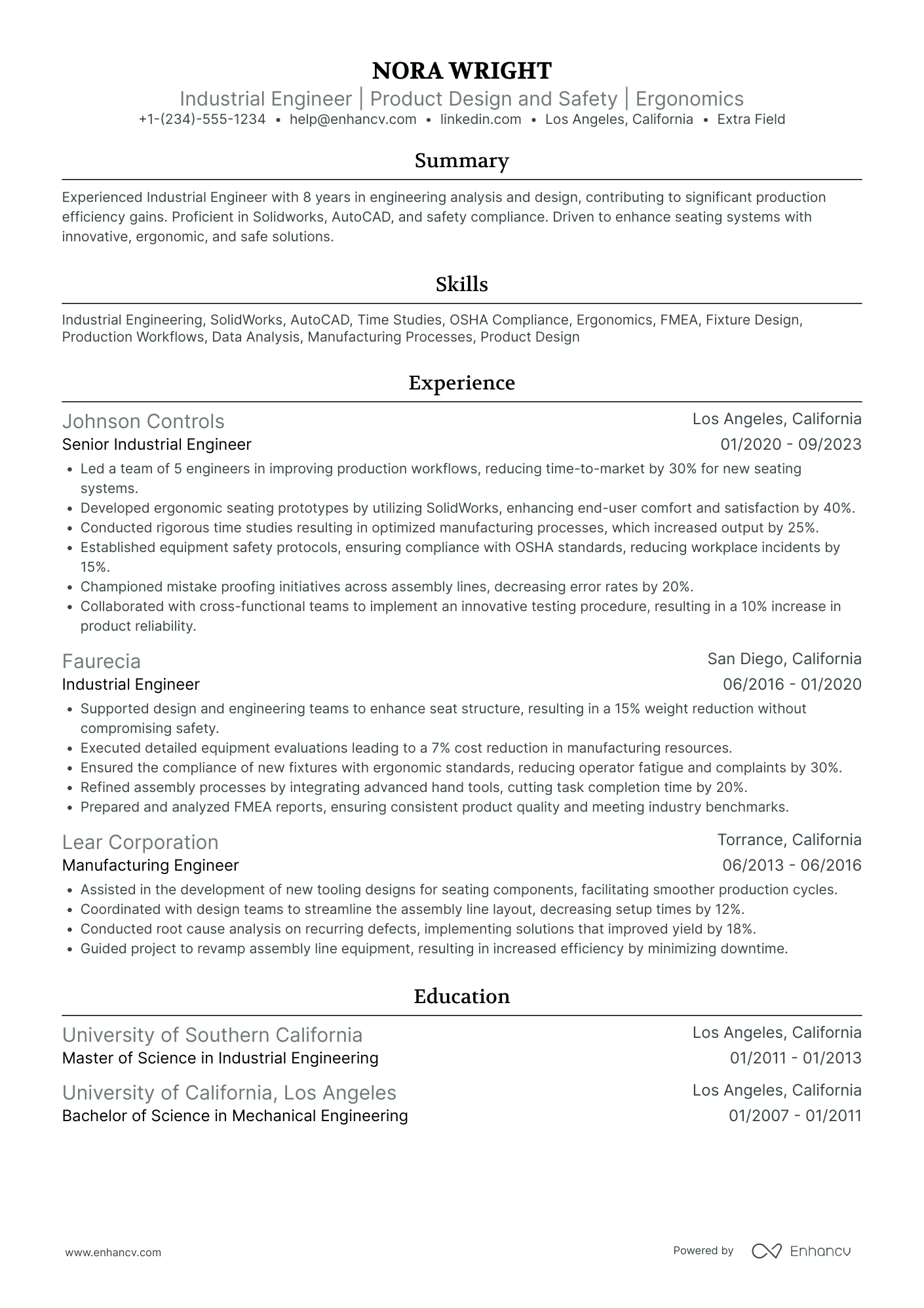Mechanical and Electrical Engineers think industrial engineering is a joke. But when push comes to shove and the production floor is in total chaos, guess who they call? Right.
As an industrial engineer, you spend your days solving problems, organizing the work process, reducing waste, increasing efficiency and improving the end result.
Your skills are invaluable to all business fields - manufacturing, hospital management and IT development.
Successful industrial engineers frequently move up in their organization, eventually securing a C-level position.
Here’s an inspirational fact: Mike Duke - Wal-Mart CEO graduated industrial engineering at Georgia-Tech.
But building an empire, starts with a great industrial engineering resume.
In the course of this article you will learn how to apply your industrial engineering skills and principles to your resume - making it effective and impactful to recruiters.
Learning Notes From Our Industrial Engineer Resume Guide
- Go through 9 industrial engineer resume samples and extract best practices for your own
- How to fit your resume into a single page, which increases the chances of it being read
- How to reduce and optimize your word usage, removing unnecessary fluff
- How to write an impactful resume header, summary and work experience
- How to analyze the job description and identify which keywords to include in your industrial engineer resume
- What skills, technologies and management methods are preferred by hiring managers
- How to position your education and certificates on your industrial engineer resume
- Engineering resumes
- Electrical Engineering resumes
- Manufacturing Engineer resumes
- Mechanical Engineer resumes
- Project Engineer resumes
- Entry-level Engineering resumes
- HVAC resumes
- Quality Engineer resumes
How to Write an Industrial Engineer Resume
It’s best to look at your industrial engineer resume like a work project. In order to improve the product, you first need to analyze the process and define the requirements.
Your recruiter needs to sift through dozens, maybe hundreds of competing industrial engineering resumes. You have just 3 - 6 seconds to convey critical information about yourself before a decision is made which pile your resume goes to.
Also, you must include 100% of the required skills and experience. Automated HR software will scan industrial engineering resumes and discard the ones which don’t match the profile.
Spelling errors, vague titles, unnecessary information, bad formatting and lack of focus will easily and often instantly send your resume to the shredder. Make sure you avoid common resume mistakes.
Finally, your industrial engineer resume needs to be convincing and inspiring, so when the hiring manager gets to read it, they instantly know you’re the best candidate for the job.
A recruiter will pay attention to the following in your resume:
- Have you improved production processes and systems of distribution;
- Did you create solutions for the company to be more efficient (in production, resources and packaging)?
- What’s the level of your
- Mechanical aptitude and fundamental understanding of physics
- Evangelism of opportunities and project benefits to higher management
- A multitude of soft skills, including creativity in problem solving, critical thinking, communication, negotiation, and project management
You should notice that even though it’s an engineering position, working as an industrial engineer involves mainly soft skills.
You absolutely need technical expertise relevant to the industry. E.G. if you’re applying to an automotive manufacturing plant, you should have a deep understanding of how cars work and what each of their subsystems do.
However, on a daily basis, you will mainly use your soft skills to organize the manufacturing process, increase efficiency…and profit.
Your industrial engineering resume should reflect on your ability to solve problems and what benefit you have created for your past employers.
Most important sections of industrial engineer resume
- Well organized resume header section listing your name and contact details
- Impactful resume summary outlining your experience, skills and achievements
- Work experience section solidifying the initial impression with practical examples of the improvements and solutions you contributed to your workplace
- Clear and concise skills section listing your technical and soft skills, tools, technologies and management strategies
- Dedicated corner for your education and certificates - especially if you have completed your FE / PE exams
- Depending on your specific case, an Awards and achievements sections may be worth adding
Check out all the resume sections available, you might come up with a resume layout of your own, who knows. But if you are not in the mood and want something that was already trested, stick to the layourts mentioned above.
Depending on your experience and previous projects, you may want to organize the sections in a reverse-chronological or hybrid resume layout.
The first lists your work experience and education in the common timeline format, followed by skills, achievements, etc.
The later mixes in skills and work experience to provide the information most relevant to the job offer at the top of the resume.
What Does a Good Industrial Engineer Resume Header Look Like?
Whichever layout you choose, the resume header always leads.
Recruiters can and will reject you if they spot errors in your header or if there is missing information. This signals a lack of attention to detail, which is incompatible with your profession.
Keep the header simple and organize your contact information in a clear and readable format.
Review a couple of industrial engineer resume samples below.
2 industrial engineer Resume Header Examples
At first glance, this header looks fine - name, title, phone number…But where is the email ? How will they send you details about the interview?
You’re also missing the chance to impress with relevant links and keywords in your title.
These errors seem miniscule, but when recruiters examine your industrial engineering resume, that’s the only thing they see about you.
…and in this case, it’s not very impressive!
It needs just a little effort to make it right. Let’s see another resume header example.
Okay, what are the differences?
There is an email listed now, as well as better described location. There will be no problem to contact this industrial engineer if the company is interested in setting up an interview.
What’s more, the applicant has added more details in the title. We know they have experience in the automotive industry and are likely quite knowledgeable about cars and how they work.
Finally, there’s a website listed. Perhaps it’s their personal portfolio, or they may have their own engineering practice, or a consultant agency.
There is a positive impression just knowing the candidate went through the trouble of setting up their own page.
How to Make Sure Your Industrial Engineer Resume Summary Creates an Impact
The header makes a proper introduction, but it’s the resume summary section which drives your point home.
Well written summaries get recruiters excited and keeps them hooked to your resume.
At the same time, you must use it strategically and emphasize on the skills and experiences most relevant to the job offer.
This is a lot to ask from a couple of lines of text. But it’s enough for recruiters in order to distinguish the professionals from the amateurs.
It will become more apparent with a couple of samples from industrial engineering resumes.
Optimize your resume summary and objective for ATS
Drop your resume here or choose a file.
PDF & DOCX only. Max 2MB file size.
2 industrial engineer resume summary examples
This summary is not very good. It does convey some information about the engineer, but remains vague.
- What production lines?
- Which industry?
- How did they improve the process?
Your industrial engineering resume should provide answers, rather than raising questions.
It’s vital to be specific and only use words that add value. Trim everything unnecessary.
Scan the job offer and try to incorporate the skills and technologies which are most prominent.
This engineer clearly knows what they are doing. They lead the summary with how much experience they have and what role they climbed up to during their career.
“Worked directly with Head of Production” signifies that not all of their colleagues had such contact with higher management, which means their work was trusted and important to their employer.
Next, they use proper industry keywords, which minimize the amount of text, while providing essential information about their work.
- SOP - Standard Operating Procedure
- Time Studies - a common process to analyze the performance of workers
- KPI - Key Performance Indicators
- Six Sigma - widely successful methodology for improving productivity, quality and cost in almost every kind of process.
- Just two sentences convey enough information that recruiters can easily decide whether the applicant should be investigated further.
- •Monitored workers performance on the assembly line
- •Tracked production output, quality and efficiency
- •Worked with product engineers to improve manufacturing speed
- •Submitted weekly and monthly reports to higher management
This is as soulless of a job description as they get. The bullet points hardly provide information beyond the obvious responsibilities when working as an industrial engineer.
This work experience raises more questions than it answers. Nobody would chase you down for this information, unless it is a Fortune 500 company.
But then again, if you worked for one, you’d know to be more specific with your work experience.
Let’s make it right!
- •Conducted time studies and motion economy studies of workers on the production line to find opportunities for improvement.
- •Improved rubber stamp output by designing interlocking cutting forms which maximize the items on a blank sheet and saving 38 minutes of the operator’s time
- •Persuaded product engineers to alter the product design requirements, reducing the total number of moulds used and cutting down production time by up to 9%
- •Reviewed factory plans and layout schematics and rearranged a few work stations to reduce transportation of material and improve pipeline flow.
- •Reported weekly to the Plant Manager with analysis on KPIs, and Root-cause analysis for ongoing problems throughout the production pipeline.
This industrial engineer has clearly explain the work they have done for this employer. They list a number of activities which are common for industrial engineers and show the applicant has indeed practiced their profession.
On top of that, this engineer has included a couple of the improvements they implemented and what results they achieved:
- Just under 8% of one operator’s entire work day.
- Reduced production time by up to 9%
- Convinced other engineers to do something they didn’t intent
This proves they are a natural problem solver, a great negotiator and have created true, practical benefits for their company.
That’s what recruiters and hiring managers want to see!
Student Or Entry-level? Here Are Tips for Your Junior Industrial Engineer Resume
An entry level industrial engineer resume should be constructed around your university courses and skills.
Open up with a header and an industrial engineering student objective, where you lay out your motivation and set the expectations of your recruiters.
Then, add a detailed education section, relevant experience and skills.
"How to List Continuing Education on Your Resume"
Chances are you have minimal work experience if any. Your best bet would be to target industrial engineering internship with the possibility to get hired after the initial test period.
One way to edge over your competitors is with extracurricular activities. If you participate in university clubs like an Engineering, Science or Student Racing Club, you will gain significant practical experience and technical knowledge.
On the other hand, leadership experience, volunteering for charity and organizing school parades or plays teaches you the soft skills essential for becoming an industrial engineer.
It’s important to include all the skills mentioned in the job offer, without misleading your recruiter. If you are lying on your resume, you will get caught and not make it farther than the interview. Don’t make that mistake out of ambition to get your foot through the door.
Be 100% legitimate and honest about what you bring to the table.
What’s the Proper Way to Describe Your Skills on Industrial Engineering Resume
Your recruiter may or may not be adept at industrial engineering, and will judge you on a set of requirements by the employer. This could well be a computer software which scans resumes for specific keywords that match the predefined profile.
A well defined skills section will help you get through the first sift, provided you carefully analyzed the job description.
Industrial engineering is one of the few engineering positions where technical skills take a back seat during daily operations.
Regardless, in order to optimize a manufacturing pipeline, you need in-depth technical understanding of every part, machine and human in the process.
- What operations are being executed? Why?
- Is there a faster way to assemble this piece of furniture? How?
- Are workers failing their productivity target due to uncomfortable equipment?
You still have plenty of engineering to do in your job. It just isn’t not always obvious to observers.
How to list tech skills in your resume
Most importantly, keep your skills focused on what the job description is calling for. Make sure the top skills are also mentioned somewhere else in your resume.
Here is a list of technical skills most commonly associated with industrial engineering.
10 Tech Skills You Can Use in an industrial engineer Resume
- Systems analysis and evaluation
- Manufacturing
- Production lines
- Processing
- Plant layout design
- Work cell design
- Machine knowledge
- Design
- Principles of operation
- Parts, tools, repair and maintenance
- Materials science and technology
- Programming skills
- Matlab
- SQL
- C / C++
- Java
- Python
- R
- Math skills
- Statistics
- Probabilities
- Linear programming
- Data management
- Collection
- Analysis
- Visualization
- Manipulation
- CAD software
- Inventor
- Revit
- SolidWorks
- SolidEDGE
- Technical measurements
- Product testing and quality control
Depending on the industry you’re working in, your role may require specific knowledge in:
- Electrical engineering
- Thermodynamics
- Fluid mechanics
- Aeronautics
- Marine engineering
- Chemical engineering
How to list soft skills in your industrial engineer resume
Soft skills are more important for industrial engineers than other engineering professions.
- You’re collecting information from a variety of sources and people from all levels in the company.
- You’re analyzing data, cross referencing time sheets, inspecting SOP documents, technical drawings of products and so on, looking for a pattern to identify inefficiencies
- Then you go back to those same people and negotiate solutions that may help improve the overall process
As an industrial engineer, soft skills, business and project management skills facilitate the majority of your day to day work.
Consider the example below:
What industrial engineering soft skills recruiters want to see in resumes
- Creativity
- Problem solving
- Analytical thinking
- Systematic approach
- Judgement and decision making
- Communication skills
- Listening
- Writing
- Presenting
- Reporting
- Negotiation
- Project management
- Cost analysis
- Time schedules
- Work plans
- Documentation
- Lean management
- Six Sigma management
- Root cause analysis
- Planning
- Social perceptiveness
- Education and training (of others)
- Resource and personnel management
What Are the Rules When Adding Education to Your Resume?
As with any engineering profession, you need formal education in order to legally practice. Unless you’re a student or a fresher industrial engineer, keep the education section down to the core essentials:
- Title and level of degree
- Graduation year
- Institution issuing the degree
Obviously, an industrial engineering degree from an ABET-approved university is preferred by employers.
However, it is fairly easy to secure an industrial engineering position with a different engineering degree for example:
- Mechanical engineering
- Electrical engineering
- Chemical engineering
The reason being, these degrees provide an in-depth knowledge of a particular field. This is invaluable if you’re tasked with managing and improving an industrial process in said field.
At the same time, soft skills can be acquired through a number of certification programs and additional training.
Should You Have a Certification Section in Your Industrial Engineer Resume?
Certificates do a great job of filling in the gaps between your education, work experience and the job requirements for the position you’re applying to.
By far the most valuable certifications for any engineer are the FE and PE exams conducted by each state.
Make sure to obtain your Fundamentals of Engineering (Engineer in Training) certificates at the very minimum.
A PE certificate is a symbol of excellence and prestige among engineers. Recruiters and employers will always be interested in you having one, regardless you will actually need it at the job.
Below, you’ll find more valuable certificates which may be even more valuable, depending on your position.
Top 6 industrial engineer Resume Certificates
- Lean Six Sigma Green Belt
- SAP Certification
- SAS Certification
- APICS Certified Supply Chain Professional Certification
- PMP Project Management Professional
- American Society of Quality Certification
Top Tips to Remember When Writing Your Own Industrial Engineering Resume
- Keep your industrial engineer resume simple. Remove unnecessary information and focus on the core sections.
- Always have someone proof-read your resume to avoid spelling and grammar mistakes. Those leave an awful impression and can undermine your hard work.
- Don’t underestimate the power of a good resume header. It’s the first thing your recruiter will read.
- The summary section can sink or swim your resume. It’s usually the point at which reviewers decide whether or not you’re worth spending more time.
- Hiring decisions are usually made at the work experience section. Stick to our advice - be specific, share details and results from your work.
- Skills sections do a great job filling the gaps and piercing through automated HR software. Ensure your skill section list all prominent items in the job description.
- Leave at least some space on your resume for education and certificates. If you’re an industrial engineering student, education will form most of your resume.
Industrial Engineer resume examples
By Experience
Junior Industrial Engineer
Industrial Engineering Intern
Entry-Level Industrial Engineer
Industrial Engineer II
Senior Industrial Engineer
Lead Industrial Engineer
By Role
